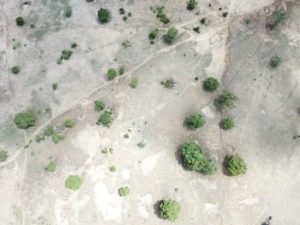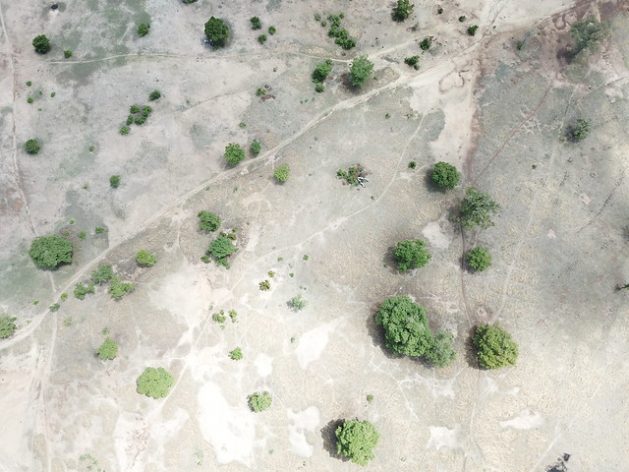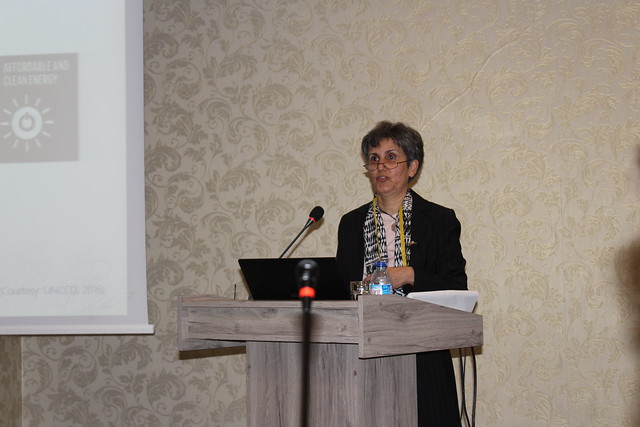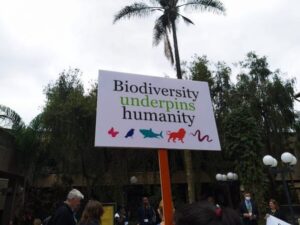
Biodiversity, Climate Action, Climate Change, Conferences, Conservation, Environment, Featured, Global, Headlines, TerraViva United Nations
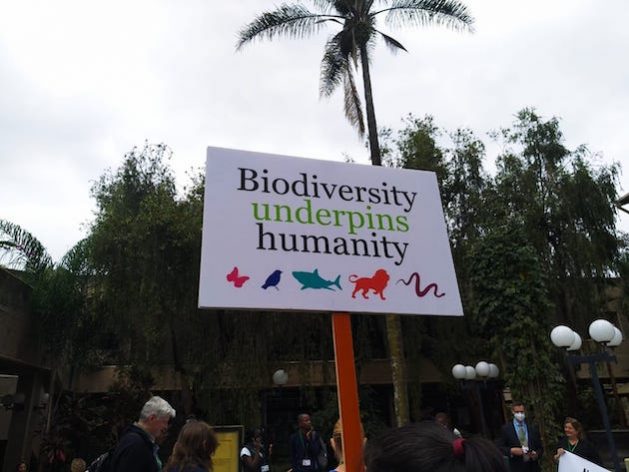
A placard on display at activists’ demonstration outside the 4th meeting of the CBD Working Group at the UNEP headquarter in Nairobi. Credit: Stella Paul/IPS
– As the last working group meeting of the Post 2020 Global Biodiversity Agenda concluded here on Sunday, the delegates’ job at COP15 Montreal just got tougher as delegates couldn’t finalize the text of the agenda. Texts involving finance, cost and benefit-sharing, and digital sequencing – described by many as ‘most contentious parts of the draft agenda barely made any progress as negotiators failed to reach any consensus.
Nairobi – the Unattempted ‘Final Push’
The week-long 4th meeting of the Working Group of the Biodiversity Convention took place from June 21-26, three months after the 3rd meeting of the group was held in Geneva, Switzerland. The meeting, attended by a total of 1634 participants, including 950 country representatives, had the job cut out for them: Read the draft Post 2020 Global Biodiversity Framework (GBF) and its 21 targets, discuss, and clean up the text – target by target, sentence by sentence, at least up to 80%.
But, on Saturday – a day before the meeting was to wrap up, David Ainsworth – head of Communications at CBD, hinted that the progress was far slower than expected. Ainsworth mentioned that the total cleaning progress made was just about 8%.
To put it in a clearer context, said Ainsworth, only two targets now had a clean text – Target 19.2 (strengthening capacity-building and development, access to and transfer of technology) and target 12 (urban biodiversity). This means that in Montreal, they could be placed on the table right away for the parties to decide on, instead of debating the language. All the other targets, the work progress has been from around 50% to none, said Ainsworth.
An entire day later, on Sunday evening local time, co-chairs of the WG4 Francis Ogwal and Basile Van Havre confirmed that those were indeed the only two targets with ‘clean’ texts. In other words, no real work had been done in the past 24 hours.
On June 21, at the opening session of the meeting, Elizabeth Maruma Mrema, Executive Secretary of the Convention on Biological Diversity, described the Nairobi meeting as an opportunity for a ‘final push’ to finalize the GBF. On Sunday, she called on the parties to “vigorously engage with the text, to listen to each other and seek consensus, and to prepare the final text for adoption at COP 15”.
Answering a question from IPS News, Mrema also confirmed that there would be a 5th meeting of the Working Group before the Montreal COP, indicating the work done in the Nairobi meeting wasn’t enough to produce a draft that was ready to be discussed for adoption.
The final push, it appeared, had not even been attempted.
Bottlenecks and Stalemate
According to several observers, instead of cleaning up 80% of the texts over the past six days, negotiators had left 80% of the text in brackets, which signals disagreement among parties. Not only did countries fail to progress, but in some cases, new disagreements threatened to move the process in the opposite direction. The most fundamental issues were not even addressed this week, including how much funding would be committed to conserving biodiversity and what percentage figures the world should strive to protect, conserve, and restore to address the extinction crisis.
True to the traditions of the UN, the CBD wouldn’t be critical of any party. However, on Sunday evening, Francis Ogwal indicated that rich nations had been dragging their feet on meeting the commitment of donating to global biodiversity conservation. Without naming anyone, Ogwal reminded the negotiators that the more time they took, the tougher they would get the decision.
At present, said Ogwal, 700 billion was needed to stop and recover global biodiversity. “If you keep giving less and less, the problems magnify. Ten years down the line, this will not be enough,” he said.
The civil society was more vocal in criticizing the delegates for losing yet another opportunity.
According to Brian O’Donnell, Director of the Campaign for Nature, the negotiations were faltering, with some key issues being at a stalemate. It is, therefore, up to heads of state and other political and United Nations leaders to act with urgency. “But time is now running out, and countries need to step up, show the leadership that this moment requires, and act urgently to find compromise and solutions,” O’Donnell said in a statement.
The Next Steps
The CBD Secretariat mentioned a string of activities that would follow the Nairobi meeting to speed up the process of building a consensus among the delegates. The activities include bilateral meetings with some countries, regional meetings with others, and a Working Group 5 meeting which will be a pre-COP event before COP15.
Finally, the CBD is taking a glass-half-filled approach toward the GBF, which is reflected in the words of Mrema: “These efforts (Nairobi meeting) are considerable and have produced a text that, with additional work, will be the basis for reaching the 2050 vision of the Convention: A life in harmony with nature,” she says.
The upcoming UN Biodiversity Conference will be held from 5 to December 17 in Montreal, Canada, under the presidency of the Government of China. With the bulk of the work left incomplete, the cold December weather of Montreal is undoubtedly all set to be heated with intense debates and negotiations.
IPS UN Bureau Report

